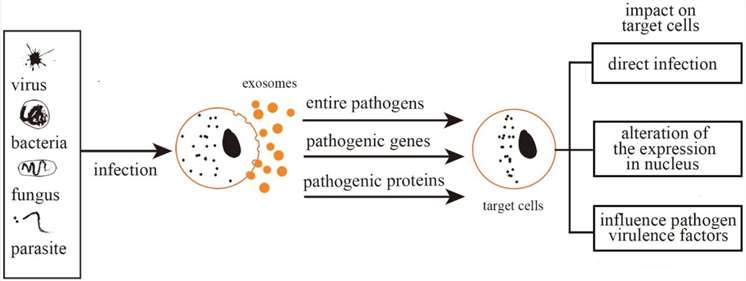Infectious Disease Exosome Research Solution
Online InquiryIn the past decades, knowledge about exosomes has been developed in various directions, especially regarding pathogenic infections. More recently, quantitative analysis of samples by multi-omics technologies has allowed in-depth characterization of exosomal proteins, lipids, RNA and other metabolites. An in-depth understanding of the content of these vesicles can facilitate their therapeutic application. Moreover, since exosomes are detected in almost all biological fluids, components of pathogenic or host origin can be identified in liquid biopsies, making them suitable for diagnostic and prognostic purposes. Creative Proteomics has been working with exosome research and analysis for years. Our reliable and customized services can support infectious disease exosome research, including exosome composition and function during viral, bacterial, fungal, and protozoan infections, facilitating the study of exosomes in host defense or pathogen transmission.
The role of exosomes in pathogen infections
Exosomes are extracellular vesicles (EVs) derived from endosomal compartments and can be released by eukaryotic as well as eukaryotes as well as prokaryotes. These EVs have a variety of bioactive molecules, the number and type of which depend on the origin and cellular state. The exosomes are then internalized by the recipient cells to deliver their contents, thus facilitating cell-cell communication in health and disease. During the process of infection, exosomes have a dual role. On one hand, these vesicles can deliver pathogen-associated molecules that facilitate the continuation and enhancement of infection processes, and on the other hand, they can protect the host by activating the immune response and reducing pathogen transmission. In both cases, exosomes enable a possible link between host cells or between pathogens and host cells.
- Exosomes can accelerate the process of infection
-Mediating further infection through the transmission of pathogen-related molecules
-Exosomes from parasites can be involved in virulence and cytotoxicity
-Participating in the immune escape of pathogens
-Promoting immune cell apoptosis inhibiting immune responses
- Exosomes inhibit the process of infection
-Inhibiting pathogen proliferation and transmission directly
-Inhibiting infection by stimulating immune responses, involving B, T cells, NK-cells, and monocyte-macrophage.
 Fig. 1 Exosomes mediate further infection. (Zhang, Wenchao, et al., 2018)
Fig. 1 Exosomes mediate further infection. (Zhang, Wenchao, et al., 2018)
Infectious disease exosome research solution at Creative Proteomics
Creative Proteomics has over a decade of experience in exosome-related services and has provided quality services to our global clients. Our dedicated team is able to provide exosome research to researchers in pharmaceutical and biotechnology as well as academic and government institutions. We offer the following list, including but not limited to:
| Exosome analysis services | |
|---|---|
| Exosome isolation and purification | Sucrose gradient centrifugation |
| Polymer-based exosome enrichment method | |
| Immunomagnetic bead method | |
| Size exclusion chromatography method | |
| Exosome identification | Nanoparticle tracking analysis (NTA) |
| Electron microscopy analysis | |
| Western blot | |
| Exosome marker assay | Isolation and enrichment of exosomal CD9, CD63, CD81, TSG101, HSP70 proteins |
| Exosome surface protein identification and quantitative analysis | |
| Exosome engineering | Exosome labeling and tracking |
| Cargo loading | |
| Engineered exosome production | |
| Cargo loading assessment | |
| Exosomes labeling and tracking | Exosome fluorescent labeling |
| Fluorescence exosome purification | |
| Fluorescent exosome concentration labeling | |
| Exosome multiomics analysis | Exosome proteomics analysis: Exosome protein profile identification Exosome protein composition analysis Exosome protein expression level analysis Exosome protein differential expression analysis |
| Exosome metabolomics analysis: Exosome differential metabolite screening Qualitative and quantitative analysis of target metabolites/metabolic pathways | |
| Exosome lipidomics analysis: Exosome lipid composition and level analysis Differential expression analysis of exosomal lipid molecules Qualitative and quantitative analysis of targeted lipid molecules | |
| Exosomal biogenesis and identification | Our capabilities will provide strong support for the study of exosome biogenesis and its identification. |
| Exosomal cargo and loading mechanism | Our services can greatly help the study of exosomal cargo and loading mechanism, facilitating the diagnostic and therapeutic applications of exosomes. |
| Exosome function research | In vitro analysis of the function of exosomes In vivo analysis of the function of exosomes |
Application of our services
- Exosomes as a non-invasive biomarker for pathogen infection diagnosis
- Exosomes as a therapeutic tool for pathogen infection treatment, including the transfer of antiviral molecules or as a vaccine to prevent infection
If you are interested in the field of infectious disease exosome research. Please contact us. Our customer service representatives are available 24 hours a day from Monday to Sunday. We look forward to working with you on your next project.
References
- Zhang, Wenchao, et al. "Exosomes in pathogen infections: a bridge to deliver molecules and link functions." Frontiers in immunology 9 (2018): 90.
- Wang, Jianjun, et al. "Host derived exosomes-pathogens interactions: potential functions of exosomes in pathogen infection." Biomedicine & Pharmacotherapy 108 (2018): 1451-1459.
* For Research Use Only. Not for use in diagnostic procedures.



